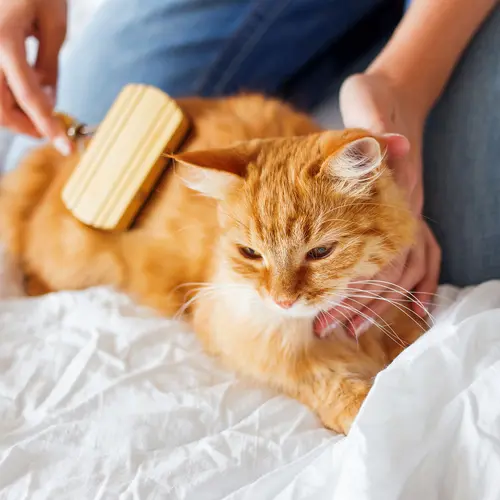Cats peeing outside of their litter box is a common problem. About 10% of cats have litter box problems at some point in their lives. It’s important to get rid of cat pee odor as thoroughly and as quickly as possible. The longer cat urine sits, the stronger the smell gets. If the smell lingers, your cat will probably return to pee there again.
There are several types of bacteria as well as uric acid in cat urine. This results in a strong odor that keeps returning. Older cats and male cats tend to have stronger-smelling urine.
Steps for Removing Cat Urine Smell From Your Clothes
Here are some steps to follow for getting rid of cat pee smell.
Don’t mix your clothes. Cat pee odor lingers. Don’t throw your things with pee into the washing machine with other clothes, as it can make your other clothes smell, too.
Regular products can only go so far. Regular laundry detergent as well as other typical cleaning supplies, such as baking soda, vinegar, and hydrogen peroxide, can make the smell go away, but this is temporary. However, because these products don’t remove the uric acid, the odor can return again.
Remove as much urine as possible. First, try to blot up all the pee before applying anything to the clothes. Don’t scrub it, just dab it with a paper towel or old cloth to soak up the urine until it’s no longer wet. You can use an ultraviolet light to help find any stains that you can’t see, as urine will glow in the dark.
Pretreat with enzyme cleaners. Enzymes are proteins that help to speed up chemical reactions. Enzyme cleaners break down uric acid in cat pee into carbon dioxide and ammonia, two gasses that easily evaporate. Look for products that are specifically made for use on pet odors and urine. Some of these can be used on different surfaces, including fabrics, but be sure to follow directions and test on a small area first, especially on more delicate materials.
Soak it. The clothes should be soaked in an enzyme cleaner and left to sit for 10 to 15 minutes. Then blot up the enzyme cleaner and let your clothes air dry, so that the uric acid can be broken down properly.
Machine wash. Use your washing machine to wash the stained clothes, preferably with an enzyme detergent. Afterward, air dry your clothes. Some recommend adding one pound of baking soda to the wash or running a cycle with a cup of white vinegar and no detergent, then running a second cycle with regular detergent.
Try again. Cat urine odor is a difficult smell to get rid of and you might have to repeat the steps again until the smell is gone.
Things to Watch Out for
What not to use. Don’t use ammonia-based cleaning products, as it smells like cat pee and will attract your cat to keep urinating there.
Health problems. When a cat pees outside the litter box, this could be a sign of health issues or behavioral problems. Urinary tract problems and bladder inflammation or stones can be painful and make your cat urinate more. Kidney diseases, diabetes, and thyroid issues can also be a possibility as cats feel the need to drink more and pee more. Other possibilities include problems with your cat’s joints, nerves, or muscles, which can make it hard for them to climb in and out of the litter box. See your veterinarian to rule out any health problems.
Age issues. Older cats, especially those 10 years or older, may have age-related cat dementia or cognitive dysfunction. One of the behavioral problems associated with cognitive dysfunction is peeing and pooping outside of the litter box. See your veterinarian to rule out any age-related problems.
Check the litter. The litter box could be dirty or your cat may dislike the litter in it. Change the litter more often. You can also experiment with different types of litter. If you have several cats, the more dominant one may have marked it as their litter box, leaving the others to find someplace else to use as a toilet.
Stress. Another possible reason for not using the litter box is stress. This could be due to recent household changes, such as a new pet or family member. Cats like routine and small changes, like moving the litter box, can make them uneasy. If the change is permanent, try rewarding your cat with attention and treats when they are exposed to the thing that stresses them. This way they can learn to associate positive feelings with it.

